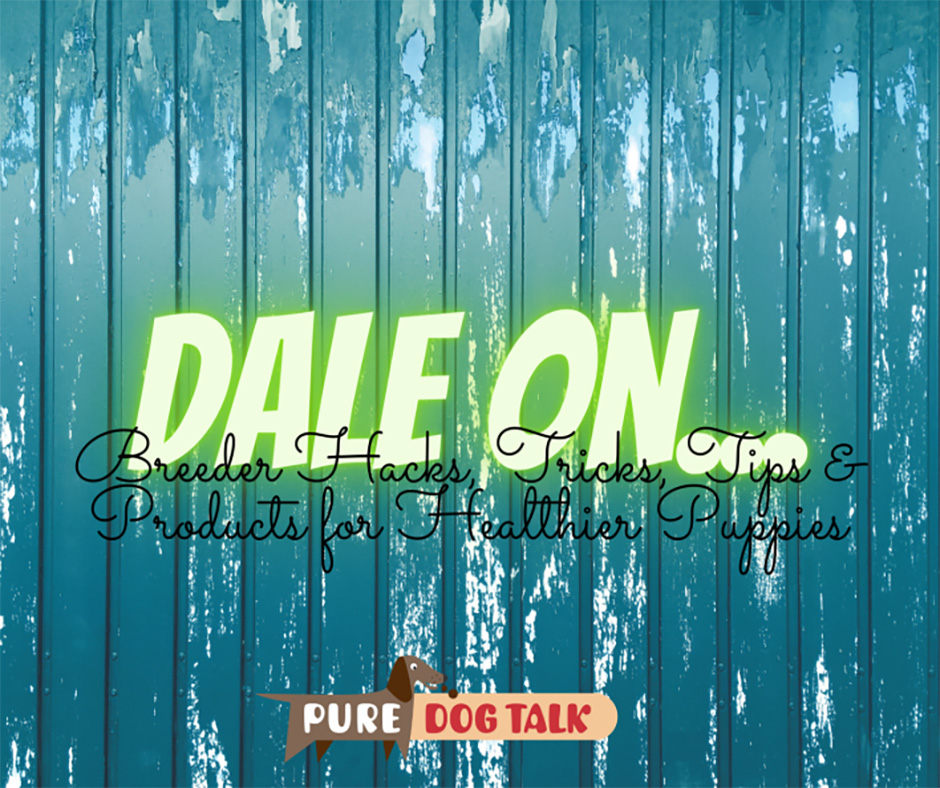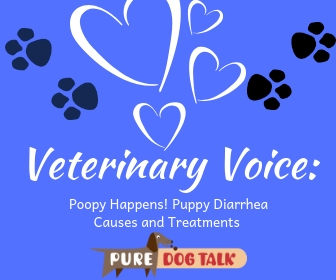425 – Breeder Hacks, Tricks, Tips & Products for Healthier Puppies
Breeder Hacks, Tricks, Tips & Products for Healthier Puppies
Dale Martenson, renowned breeder of Touche Japanese Chin, joins host Laura Reeves to talk about some of our favorite hacks, some of our favorite products, some of our favorite things as dog breeders that don’t necessarily make it into the textbooks.
LISTEN to the episode for more details, by clicking the triangle arrow above.
Milk Balloons
“Litters of puppies, if we were going to put it in the hands of Mother Nature,” Martenson noted, “it would often be more like sea turtles … a certain percentage of them were meant to make it to the water and a certain percentage are not. As breeders, we want to tip the scales. We can add some supportive care, just to give those little turtles a boost to the water, to make it to a healthy adulthood…”
Martenson uses surgical gloves as an alternative method of supplemental feeding. Tube feeding can be difficult and even dangerous if not done properly. Plus, the actual process of suckling is important to the puppies’ digestion and development.
Heat from Down Under
Martenson shares methods for warming puppies while offering the bitch a cooler location in the whelping box, the dangers of heat lamps in general and the importance of providing a heat source *under* the puppies.
Do the Hoky Poky
Flooring for puppies in the whelping box is critical. A number of studies indicate that puppies whose feet slip while nursing or navigating the box are more likely to develop hip dysplasia. Martenson recommends small carpet remnants for toy breeds. We agreed that large, rubber backed washable fleece pads are a better choice for larger breed dogs.
Pumpkin Powder to the Rescue
Only dog people are as obsessed with poopy. The product Martenson recommends helps pups transition to new water, new schedule, new environment, possibly new food with no intestinal upset.
Eat up!
“ENTYCE is a fantastic appetite builder. So say your female isn’t wanting to eat and she’s 50 days, she’s trying to have pregnancy toxemia on you. Then you’re looking at hand feeding, syringe feeding, whatever kind of feeding we can do to make this happen. We’ve had fantastic results with that or traveling to the dog show and they’re not wanting to eat on the road. “
328 – Poopy Happens: Puppy Diarrhea Causes and Treatments
Poopy Happens: Puppy Diarrhea Causes and Treatments
Puppy diarrhea can be serious and dangerous due to dehydration risks, says Dr. Marty Greer, DVM. While “poopy happens” is a pretty common issue in a litter of puppies, some causes are more serious than others.
Causes of “bad potty” can range from the benign to the deadly and knowing which is which and how to treat them can be a matter of life and death.
“I can’t believe I ate the WHOLE thing….”
Overeating is pretty common, particularly when puppies transition to solid food during weaning.
“While nursing, the diarrhea is white in color, and the puppy is very hefty,” Greer said. She strongly recommends dog specific probiotics during weaning, particularly Proviable or Fortiflora.
“What do you have in your mouth?!”
Eating inappropriate stuff like rocks, sticks, leaves is another common problem in puppies that can cause stomach upset and loose stools. Since puppies are curious and often investigate their new and expanding world with their mouths, it can also be dangerous! Watch what they pick up and police their areas for hazards.
All kinds of bad bugs
Viral infections such as parvovirus and distemper are life threatening emergencies. Certain breeds don’t titer well to parvo vaccines and these diseases can even be transmitted by raccoons in “latrines.”
Parasites, Greer noted, affect as much as 95 percent of puppies. Worm puppies at 2, 4, 6, 8 weeks if the bitch is not on dewormer *during* pregnancy. Greer recommends a specific protocol of treating the pregnant bitch with fenbendazole daily from the 5th week of pregnancy to the 2nd week of lactation.
“You can worm bitch forever, but parasites will encyst in her muscles,” Greer said. “The stress of pregnancy and lactation reactivates these into her bloodstream. The parasites are then passed through placenta AND milk to the puppies. Puppies that are still nursing, are still receiving the larval form of the parasite through milk.”
Giardia and coccidia are common in puppies. Giardia responds to Panacur. Coccidia responds to Albon.
Cleanliness is next godliness
Bleach is my favorite disinfectant. Visit this site to learn about proper dilution in different scenarios: https://www.aspcapro.org/resource/bleach-dilution-calculator
Treatment
Kaopectate, the human-grade over-the-counter item, has changed the formula and metabolizes as aspirin in the dog, Greer said. She strongly recommends a low-cost and effect solution, the original kaolin-pectin.
And don’t forget to send your puppies home with insurance!!


